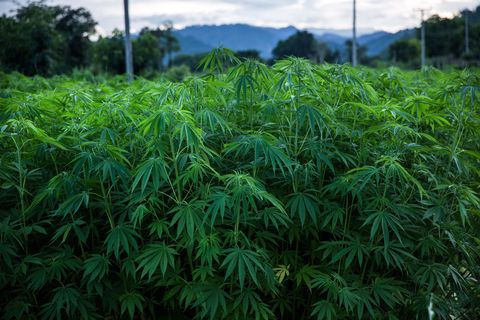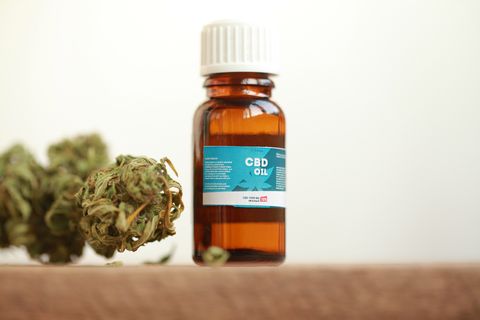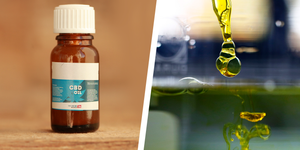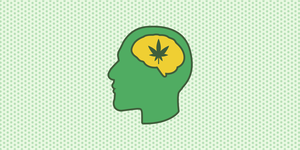
On Tuesday, the Senate voted to approve a new an $867 billion farm bill, and on Wednesday, it passed in Congress. While the bill has plenty of positive merits, the one people are perhaps most excited about is the fact that it will legalize the production, sale, and distribution of industrial hemp at a federal level.
Of course, much of the push to legalize hemp comes from the fact that it contains cannabidiol, or CBD—a compound with a host of purported health benefits, and without the psychoactive effects of its chemical friend THC. The hemp industry could be worth an astonishing $20 billion by 2022, CNBC reported—and much of that worth will come from the CBD industry.
If you’re into CBD, the news is probably pretty exciting—but there are also some additional hurdles on the way. Here’s what to know about the farm bill and what it means for people who use CBD.
What’s the deal with the Farm Bill and CBD?
First, some background on hemp: The 1970 Controlled Substances Act classified both hemp and marijuana as Schedule I drugs, or substances with “no currently accepted medical use and a high potential for abuse.”
The new farm bill will take industrial hemp off the Schedule I list, allowing it to be “cultivated for any use”—including the production and extraction of CBD. Hemp will be classified as a regular agricultural crop, meaning growers across America can begin cultivating and selling it, buying federally-subsidized crop insurance, filing for trademarks and advertising their product. This means that as a CBD consumer, you’ll likely start seeing a whole lot more hemp-derived products on store shelves soon.
Note: The farm bill does not legalize the growth and sale of marijuana on a federal level. While marijuana also contains CBD, most strains of the plant also contain THC, which the government still has a major issue with. If your CBD is derived from marijuana—and not hemp—it will still fall within Schedule I of the Controlled Substance Act, meaning it will not be legal federally.

Getty ImagesOlegMalyshev
Getting the government onboard with CBD was harder than you’d think.
CBD is a cannabis-derived compound that—according to mountains of anecdotal evidence and some scientific research—can help with everything from general aches and pains to cancer-related nausea and epilepsy. There are very few peer-reviewed studies on the effects of CBD on the human body, but this year, the the Food and Drug Administration made history by approving a drug containing CBD to treat two rare and severe forms of epilepsy.
“Our biggest challenge to legalizing hemp was the popular confusion with marijuana,” Jonathan Miller, legal counsel of the U.S. Hemp Roundtable, told MensHealth.com. “The biggest challenge with CBD was that it was introduced publicly as a medical marijuana product.
“While now a majority of Americans support legalizing pot, it’s not the prevailing view in Congress. We had to demonstrate the difference between hemp and marijuana, and explain that hemp-derived CBD cannot get you high—but most importantly, that hemp could be an extraordinary cash crop for American farmers struggling in the heartland.”
“Our biggest challenge to legalizing hemp was the popular confusion with marijuana.”
The farm bill does NOT mean CBD will immediately flood into stores across the country.
It’s crucial to point out that the fight for peace, love, and CBD happiness may not be over yet.
While hemp-derived CBD is now off the list of Schedule I controlled substances, it will still be subject to regulation from the FDA. To date, the FDA has not listed CBD as “Generally Recognized as Safe,” according to the National Law Review, which is a legal requirement of all food additives. The same is true for supplements.
And though hemp and CBD will be legal on a federal level, states will also get a say—and not everyone is on board. As the Wilson Elser Cannabis Law practice team explained, “State agriculture departments and Native American tribes will be free to regulate hemp in the same manner that any other agricultural commodity is regulated.”
For example, right now, Alabama’s state attorney general said that “all CBD is illegal under Alabama law, except for the prescription drug Epidiolex.” Alaska’s Department of Environmental Conservation said “there are no lawfully approved sources of CBD” available in the state. Because of this, CBD cannot be sold or used in food establishments, as it would need to cross state lines to get there. And oddly enough, the state of California also banned the use of CBD products in food, despite legalizing the use of marijuana—which contains CBD—in food earlier this fall.

Getty Imagesyavdat
Put simply, it could still be some time before CBD is fully legalized on a state level nationwide.
But, as Jonathan Miller, legal counsel of the U.S. Hemp Roundtable, told MensHealth.com, The U.S. Hemp Roundtable will be working hard to advocate for permanent legalization at the state level in jurisdictions they view as “problematic.” It will also assist the U.S. Hemp Authority—an industry certification program that provides high standards, best practices and self-regulation for hemp and hemp products—to give out a certification to only the best in the business to help consumers make smart CBD purchasing decisions.
Don’t give up hope, CBD fans! According to The Brightfield Group, an intelligence provider of Cannabis and CBD industries, you’re probably going to see a whole lot more CBD-infused products hitting store shelves in your future, including topicals and skincare products. And you’re probably going to see them from big-name CBD brands like CW Hemp and CV Sciences, who own a large majority of the CBD market.
“Those are the brands that are going to be able to make it to the shelves of Target, Walgreens, and CVS,” Bethany Gomez, Brightfield Group Director of Research, shared with Yahoo. “They are also the ones best suited to complete the required tests to win any necessary approvals.”



Source: Read Full Article